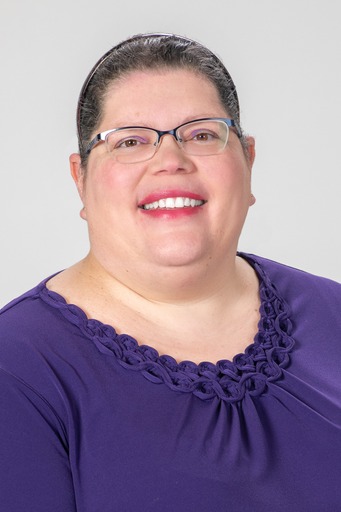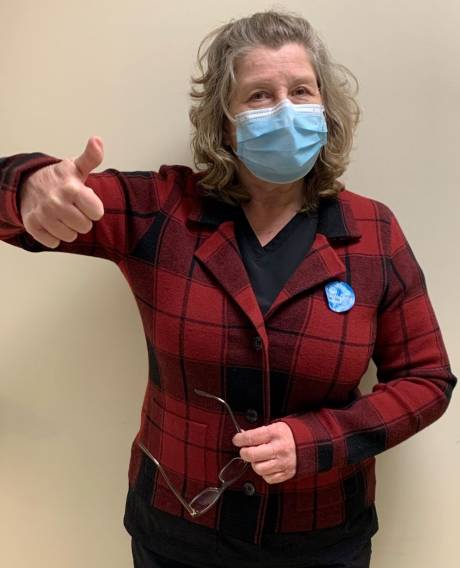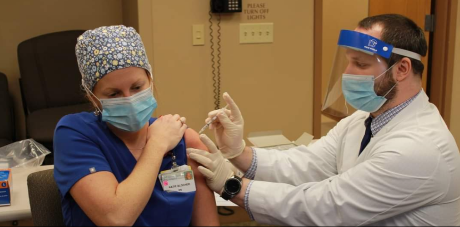In a major announcement today, the U.S. Food and Drug Administration is reporting the approval of the first COVID-19 vaccine – the vaccine known as the Pfizer-BioNTech COVID-19 Vaccine.
It now will be marketed as Comirnaty for the prevention of COVID-19 disease in individuals 16 years of age and older.
The vaccine also continues to be available under emergency use authorization (EUA), including for individuals 12 through 15 years of age and for the administration of a third dose in certain immunocompromised individuals.
In response to this news, Edward E. Walsh, M.D., head of Infectious Diseases at Rochester General Hospital, and Ann Falsey, M.D., professor of Infectious Diseases and co-director of the Vaccine and Treatment Evaluation Unit at URMC and RRH Infectious Disease Physician, took questions from media members via a Zoom call at noon.
Following is that question-and-answer session:
Q. How does this process work exactly to get to this decision made by the FDA? What does it take to get full approval?
A. Walsh: Essentially, it is to collect longer timeframe for safety data, as well as increased amount of data on efficacy. The EUA (Emergency Use Authorization) was approved essentially after 2 ½ months and this is with data that was submitted in June, so it includes data out to six months and it’s that kind of longer-term data that is required for full approval.
Q. Do you believe that this will change public confidence in people who are hesitant in getting the shot, and explain what Rochester Regional (Health) is really hoping that this could change for public perception … to show that vaccine really works now?
A. Walsh: I think for some people this may be important. It’s not clear at this point if it will come to pass that a significant number of people who are hesitant to get vaccinated will now do so. There have been surveys done … which suggest that there is a significant number of people who have been hesitant will step forward now that it has received full approval. But will have to wait and see if that actually happens.
The second aspect of this is that apparently this will make it a lot easier for organizations, including the healthcare organizations, to mandate vaccination as a requirement for working. Which is a very controversial and much debated in public spaces position. It apparently will allow that to move forward more easily.
Q. What do you see as the fallout to that (noting there is a small, vocal group of healthcare workers that said they won’t get the vaccine?
A. We’ve already seen that happen in certain institutions that have made it mandatory to be vaccinated, even during the period in which it was covered by the EUA. I imagine that there will be somewhat similar vocal outcry by some individuals and possibly groups. We’ll just have to see.
I can tell you that in the past, with influenza vaccine mandates this has been a struggle prior to potentially mandating flu vaccines in healthcare environments. Only about 75 percent of people would become vaccinated each year; once it was mandated, we now exceed 90 percent, often reaching 95 percent. So, it may allow us to move forward.
Q. (Could you address) the hesitancy of some folks, who say I’d like to see this get approved by the FDA, and now were at that point?
A. Falsey: “Basically the proof is in the pudding; We’ll have to wait and see what happens. I, took, have had numerous conversations with vaccine-hesitant people, and some raise very reasonable concerns that it’s a brand new vaccine (that) came along very rapidly and want to see more data and the FDA fully approved it. I, personally, might say I don’t think you’re assessing risk/benefit properly (but) those are reasonable concerns from reasonable people.
But, I do hope that this approval and this review of this safety data, will will give them the confidence to get what is a safe vaccine and get themselves protected.
Q. How does this approval help public confidence … for some of those people who were on the fence?
A. Falsey: I hope it will help a lot. There are some people who are anti-vaccine, and no matter what the FDA does they won’t trust it or believe it. But there is a group of people … who are just nervous and this is the reassurance that they will need. I hope it goes a long way.
Walsh; I would echo that hope that it does go a long way. I think people need to realize that these vaccines were scrutinized by a very large number of individuals and coming from different backgrounds to assess their safety. This discussions that take place are very long, they review an enormous amount of data. One thing that people should realize that following rollout vaccine in late November, essentially early December, the CDC (Centers for Disease Control) has been very meticulous in tracking side effects now for essentially nine months. And they have been able to uncover any of the concerns than anyone would have with these vaccines. So, … it’s including data that extends out nine months to the general public and for a year we are now seeing in our vaccine study here at RGH (Rochester General Hospital) with the Pfizer vaccine group … we’re seeing the now out at a year.
Q. Do you foresee that Moderna, Johnson & Johnson (approval) will be coming up soon?
A. Falsey: For a full licensure, you do need six months of safety data. Moderna had its EUA shortly after Pfizer, so I would think they would be next up to become fully approved … J&J will take a little bit longer.
Q. Is this a normal timeframe for vaccines to be approved or was this hastily done?
A. Falsey: It was sped up quite a bit, but no steps were not done. All the phases, all the safety were done, it’s just that it was a huge public health crises and everyone was working non-stop. Things were done rapidly,
Walsh: The preliminary scientific basis for this vaccine was developed over 10 years prior to the pandemic. That’s an enormous amount of work that normally is rolled into how long it takes to make a vaccine. That whole process was done prior to the pandemic even starting; it was a real head start here.
The process of going through Phase 1, Phase 2 and then Phase 3 trials was speeded up but iwas primarily in the Phase 1 period which normally would take from six months to perhaps even a year. Through a very safe mechanism, you can make those go faster; because of the pandemic, they had to. As far as the Phase 3 study goes, because of the pandemic, the decision was to monitor the effectiveness of this vaccine – and all of the vaccines -- in real time rather than to simply say, ‘Let’s just analyze this data at the end of the year.’ They said, ‘Let’s analyze this data week by week to see how long it would take to demonstrate efficacy.’ And when you demonstrate 95 percent efficacy against all infection and 100 percent against severe disease at 2 ½ months, you have data that says, ‘Let’s move this forward in the face of a pandemic killing .. over 500,000 people.
Q. As far as efficacy against the Delta variant, some studies show that Moderna has a stronger efficacy than the Pfizer. Is this just a timeframe thing that Pfizer is being approved before Moderna?
A. Falsey: “I’m not specifically aware of which study you are discussing. A lot of the global data that looks at real world effectiveness of these vaccines as we look through the different variants, they all look very effective against severe disease and death … The full approval process really has more to do with safety. So, Pfizer finished their study and applied for EUA, and had a little bit of a jump there, and that’s why they have six months of safety data first, and they received their full licensure. I am sure Moderna will be along quickly.
Walsh: … for six months we’ve seen the data, and the efficacy seems to be very similar. Real world data from various states in U.S., suggested that the Moderna vaccine was holding up a little bit better than the Pfizer vaccine, but not in terms of hospitalization, severe disease and mortality. It had to do with whether or not a minor or mild infection would occur. And these are relatively small studies …
One of the problems with collecting data in the real world as opposed to an actual study, where you’re monitoring every person, is that it really requires people to come forward with minor illnesses and mild illnesses, and it also requires states to report all their illnesses, for instance, hospitalizations, mortality, and that is not always done. So, it’s a little difficult at times. I think at this point, I’d argue that there’s probably not much difference between these two vaccines in terms of their benefit.
Q. Do you hear from their patients that this is something that they care about – about FDA approval?
A. Falsey: From a select few. The majority of patients either fall into the category of vaccine enthusiasts versus … those who just aren’t going to get it. But, there are a group of people that this a step that gives them confidence. They are worried that these are new vaccines and they want full approval and review by the FDA. There are people that this is meaningful.
Q. How instrumental was URMC and Rochester Regional was in the studies for Pfizer?
A. Walsh: This town – URMC (University of Rochester Medical Center) and RRH -- provided Rochester the opportunity to really participate in cutting edge of development of the Pfizer vaccine … and also work locally with the Johnson & Johnson vaccine as well as the Astrazeneca vaccine and the concept of mixing different vaccine strategies with different vaccines.
So, Rochester, the University and RRH have contributed an enormous amount of effort to push this forward. In a certain sense, I will say that among the infectious disease community, to a large extent, … it was essentially like getting drafted into the army. We had to stop doing all of the normal things that we do and focus on essentially one disease and one illness.
Q. What regulations did this vaccine exactly have to pass … to be fully approved by the FDA?
A. Walsh: I can’t give you every detail that is required … I’ve not sat through committees that go through this process. But, as I mentioned before, it requires full vetting from all of the data from study subjects – and there are 42,000 of them in Phase 3 study. If you looked at all the data from those as well as the data from the Phase 1 and Phase 2 studies, which were much smaller, I think specifically, looking at safety data. In addition, they do have access to all of the safety data that has been developed after the EUA rollout in December. That information is dependent upon individual reporting, whether it be physician or people in the community who have been vaccinated. Whereas the study subject data of 42,000 individuals, that data is very meticulously collected … very granular, very detailed and highly scrutinized.
Q. Why do you believe it wasn’t approved fully for those 12-15 (years old)?
A. Walsh: Again, this has to do with timing. The data for 16 and up, or 17-18 and up was part of that first phase of the Phase 3 studies were once that starts moving, they went into 12-16 groups, so that is somewhat behind so we don’t have the data yet … to be fully approved.
Q. What do you think this says for the future of mRNA technology?
A. Walsh: I think it opens up opportunities in many areas where we have been unsuccessful in developing vaccines. There are many diseases that we do not have effective vaccines, or have not event attempted to look into the possibility of vaccines -- especially for viruses, It also opens up the possibility of an effective strategy to improve our existing vaccines, such as influenza. In good years, we’re happy to see 50 percent effectiveness … If we could get very high degree of efficacy it could really do a lot of public health good. I think you can make the same argument for a lot of diseases for which we really haven’t pushed hard for vaccines.
This technology may be very effective. And those studies will be slowly starting … we’re obviously still mired down in the pandemic and the problems with that issue. Boost the doses, and the variants of coronavirus that may arise and have to be dealt with. At some point, this technology will be applied to other vaccines.
---------------
Update: 4 p.m. in response to comment below:
Under the Public Readiness and Emergency Preparedness Act, companies like Pfizer and Moderna have total immunity from liability if something unintentionally goes wrong with their vaccines. And, although the vaccines have been approved by the FDA, people can't sue that government agency as it has what is known as "sovereign immunity."



